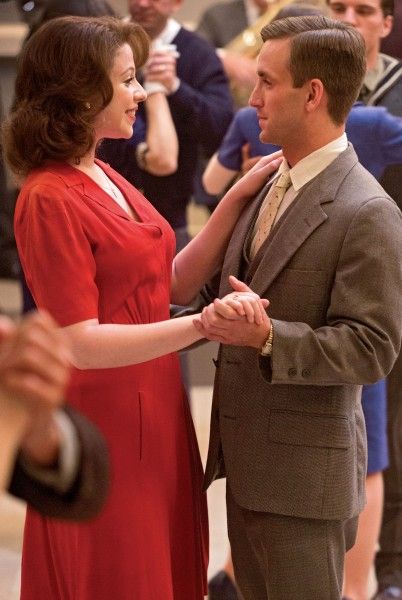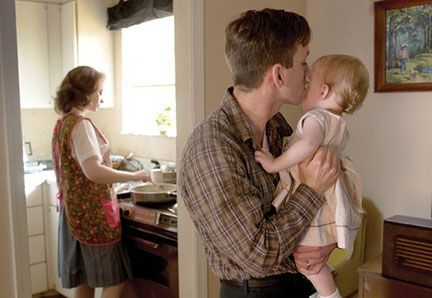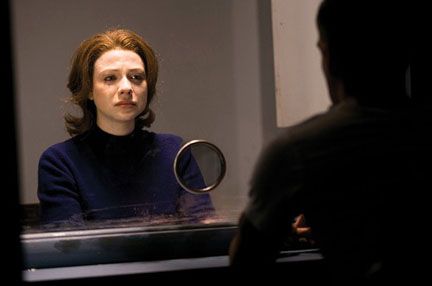Produced by Scott Free Productions and based on the best-selling book by Bill O’Reilly and Martin Dugard, National Geographic Channel’s Killing Kennedy chronicles the build-up to one of America’s most shocking events – the assassination of President John F. Kennedy by Lee Harvey Oswald. In 1959, two men faced major turning points in their lives, one in Washington, D.C., preparing to announce his presidential candidacy, and the other at the U.S. Embassy in Moscow, renouncing his American citizenship. This film charts the highs and lows of those two men, eventually intersecting with two shocking deaths that stunned a nation. It stars Rob Lowe as President John F. Kennedy and Will Rothhaar as Lee Harvey Oswald, with Ginnifer Goodwin as Jacqueline Kennedy and Michelle Trachtenberg as Marina Oswald.
During this exclusive interview with Collider, actress Michelle Trachtenberg talked about why she chased this project, what drew her to Marina Oswald, how crazy it was to see herself in the film’s wardrobe, and working with Will Rothhaar on the dynamic in their characters’ relationship. She also talked about pursuing acting roles on instinct, why she’s always wanted to be an actress, and how she’s managed to avoid the trappings of Hollywood. Check out what she had to say after the jump.
Collider: How did this project come about for you? When you were presented with this idea, did you want to run for the hills, or were you intrigued?
MICHELLE TRACHTENBERG: It was actually something I chased. When I was originally sent the script by my agents, there was talk of looking at the Jackie role, which I’m too young for. No one really even thought about Marina. As I was reading it, my manager was like, “Oh, wait, there’s the Russian girl.” I think everyone just thought they would get an unknown Russian, off-the-boat actress. But, I remember calling my agents and saying, “Well, you know that I speak fluent Russian, right?” They were like, “Oh, yeah! You speak Russian!” I was like, “Really, you guys?!” And I think Nat Geo was actually like, “There is no way! Michelle Trachtenberg speaks Russian?!” I basically said, “Okay, you don’t know this about me, so let me know it to you.” I proved it and earned the job.
Was there something about Marina that you found yourself drawn to?
TRACHTENBERG: I think it’s really interesting things she is the victim here. In my research, I read a book called Marina and Lee, which is where I got most of my information about her from, and it was done after the assassination. She sat with this woman for months and months, and told all about her backstory and how she first met Lee. I believe they were married within six weeks from when they first met at the dance, when she was in the red dress. I just felt like she is the innocent victim. I also wanted people to know that side, not necessarily to humanize Lee, but to show that he had a wife and children and, at one point, he loved just like we love. One of the main reasons I wanted to play Marina, but not necessarily meet her, because we don’t really know that much about her, I wanted it to be organic. I thought it was brilliant to be able to create something that people hadn’t seen, but also to honor a woman who’s still alive. So, I’ve never met her, but I hope to, one day. I loved her.
What’s it like to play a character like this, who’s in the middle of such a historical event, but people don’t know very much about her? Did it feel like you had more freedom with your performance, or was it more daunting because it will be the first that a lot of people see of her?
TRACHTENBERG: I’d say that Rob [Lowe] and Ginny [Goodwin] definitely had a harder job of that because Jackie and JFK are iconic. We think we know them. Much like in today’s media, we think we know all of the people that we see in our TV screens, every day. I can’t tell you how often people come up to me and say, “Hey, Michelle, how are you?,” and I’m like, “You are touching me, and I don’t know you!” People feel like JFK and Jackie are theirs. I had the luxury that no one knows anything about Marina, but it’s daunting because she’s the only one still alive, and her daughters are alive and of the age where they know. It’s really sad, the treatment of the Oswalds after the fact. I saw an interview with June Oswald where she said, “I just want my birth certificate. Give me back my birth certificate.” I guess somewhere in the vaults of our government are the Oswalds belongings. She was 30, at the time, and she doesn’t have baby toys or baby photos. That was daunting.
It must be so hard to live with that black cloud over you.
TRACHTENBERG: You know what? They honor it. The interview that I saw was from 20 years ago, but she was June Oswald. I believe she married and might have switched her name, but I believe Marina still goes by Marina Oswald.
What was it like to get into this wardrobe and see yourself like that?
TRACHTENBERG: It was absolutely crazy! When that first photo of me was released, I was getting bombarded with text messages and emails. I had ex-boyfriends saying, “You are completely unrecognizable!” It was extraordinary. Putting on her wig, every morning, just made me feel like a different person. It made me feel like I was actually transforming into this person. All of the details were meticulous. It was great. The last thing people associate me with is Gossip Girl, and this is night and day.
What was it like to work with Will Rothhaar and develop the challenging dynamic between your characters? Did you feel like you were transported into another era?
TRACHTENBERG: Yeah. All of our sets were incredibly intimate. We were not on soundstages. We were in these tiny little houses that they found in Richmond, and it was warm. (Director) Nelson McCormick was very particular about wanting us to always be in close quarters, so you felt that energy. I think Will embodies Lee Harvey, in every way. Our scenes were very powerful. There were times when Marina was in love with her husband, and there were times when she was petrified of her husband, and there were times when she was angry with her husband. It’s also remarkable for a Russian woman, in the late ‘50s and early ‘60s, to stand up for herself and take her children away from a man that was hitting her. Normally, during that time, from what I understand, no matter what, you stood by your man and you took it, and Marina didn’t. Will and I were able to hit all of those points, or I hope so.
Because it’s the 50th anniversary of the assassination, there is certainly a lot of attention and focus on this movie, and on the Kennedys.
TRACHTENBERG: Yeah. I remember the first time I saw Oliver Stone’s JFK. I was floored. I was shocked. I wanted to know every single thing about it. And it’s amazing how many people are JFK fanatics. Ben Lyons is a good friend of mine, and when Ben heard about me doing this, he texted me and said, “You have to talk to my dad.” Jeffrey Lyons is a huge JFK fanatic. He sent me DVDs of different clips to watch. He has his own theories. He sent me tons and tons of different stories. He has this great story about his father writing a letter to JFK saying, “Mr. President, you’re giving out your autograph too much. It will depreciate in value.” JFK wrote Jeffrey’s father back saying, “Thank you, Mr. Lyons. I will definitely put your opinion to thought. Sincerely, JFK.” And it wasn’t signed. That’s pretty brilliant. That just goes to show the sense of humor that JFK had about everything. Every person I talk to has a story about it. So, the fact that we’re able to, 50 years later, show it again to a youthful audience, I think it’s pretty remarkable.
Are you the type of actor who likes to get really detailed and do a lot of research for a role?
TRACHTENBERG: Honestly, I haven’t really had to do that much research for roles in the past because they weren’t real people. I was very meticulous with this. When I was a child, I played an autistic character, so I read up on autism. And when I was doing a medical show (called Mercy), I talked to nurses and did medical training. But, this is definitely the most specific role that I’ve done. I’m also a writer and a WGA member. A lot of the scripts that I write, don’t use cell phones. I try to figure out a way around a lot of what I call fingertip technology. I think our media is so saturated with information, 24 hours a day, 7 days a week, every single second, that it’s phenomenal to have a movie set in the late ‘50s where everything was still slightly untouchable. That was very attractive. Every Presidential speech is on Twitter now. The only way you could watch JFK was if you gathered your family and sat cross-legged in the living room and watched on your tiny television. It’s romantic.
Are there specific things that you look for, when reading a script and deciding whether to take a role or not, or do you just go on instinct?
TRACHTENBERG: It is instinctual. A lot of times, I really truly read it and think, “Can I think of anyone else that might do this better?” When my answer is, “No, this is a role I was meant to play,” if it’s not readily available, I chase it. If it’s lucky enough to be an offer, I attack it and kill it. It’s really about knowing when I fall in love with a character. When I start thinking about what the character would eat for breakfast, what they would wear, how they would react, and their additional thoughts that aren’t scripted, that’s when I know.
Since you started in the business when you were so young, it couldn’t have been a conscious decision. Did you have a moment when you knew this was the career you wanted?
TRACHTENBERG: My sister and I are first-generation American. My mom wasn’t even familiar with how to go on auditions and push your daughter here. I was watching TV and there was a little girl playing with a Barbie doll, and I was like, “I want a Barbie doll. How do I get that Barbie doll? I have to be on TV!” When I was a kid, my mom would have to beg me to go on playdates because I would want to go on auditions. My agreement was that I had to at least finish high school, and then make whatever decisions afterwards. School was very important to her, and acting was very important to me. I actually don’t really have childhood friends because I was always on auditions and always working. I always wanted that. My mom was just very supportive. She was just always there saying, “Are you still sure you want to do this?” And when I turned 18, I did have a thought that it was my make or break. But, I am still excited to be on set. I love what I do. As long as I have that feeling, then I’m gonna stick to it. As long as I’m lucky enough to get projects and keep working, I will always be grateful for it.
Do you think your focus and drive is really what helped you make that transition and kept you from getting lost in Hollywood?
TRACHTENBERG: The core for everything is to be grateful. It’s literally as simple as that. When fame hits you at a young age and everything is thrown at you, it is easy to get caught up in it and expect things and have people bring things to you, all the time. When you’re on set, you’re not allowed to move. Someone brings you everything. Someone brings you your breakfast. Someone brings you a water bottle. If you need a tissue, here’s a tissue. It’s easy to get caught up in that because some people forget how lucky they are. I’ve always known that I’m lucky to be an actress, and I’m lucky to be a working actress. I’m lucky to have garnered attention for certain roles, and I’m grateful for it. I know that there are a billion girls out there that would kill to be in my position, and I never forget that. That’s probably it, at the end of the day.
Killing Kennedy airs on National Geographic on November 10th.




